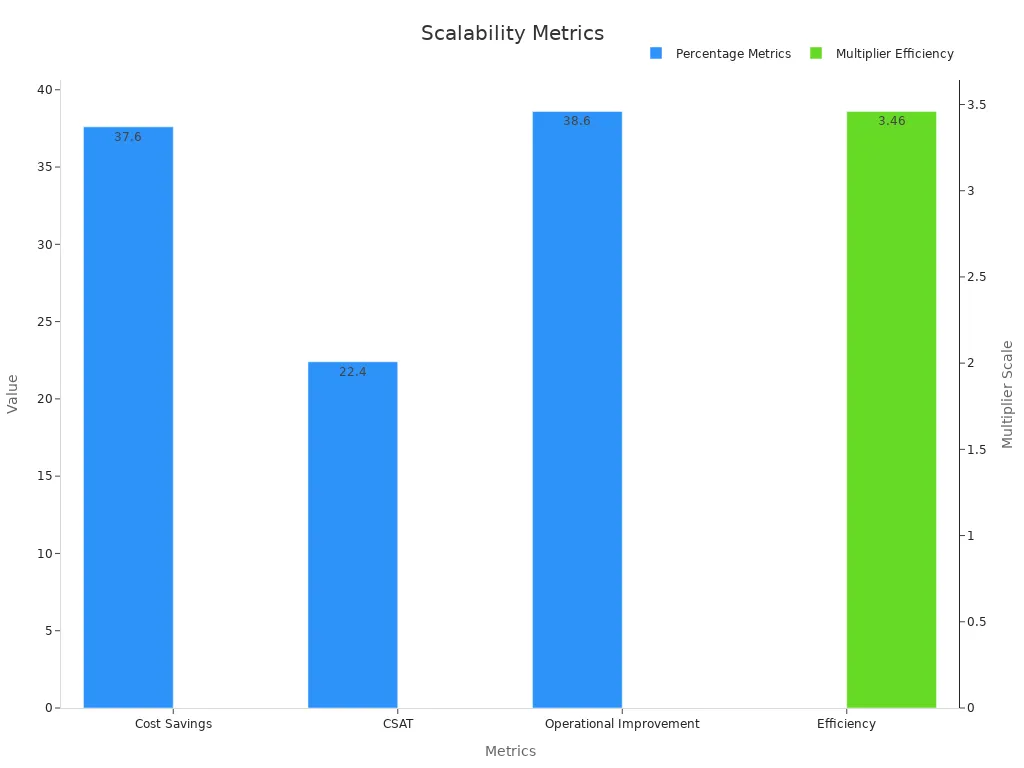
Your business thrives on delivering exceptional customer experiences. Omnichannel customer service platforms like Salesforce Service Cloud, Zendesk, HubSpot Service Hub, Freshdesk, Zoho Desk, and Knowmax help you achieve that by connecting multiple communication channels into one seamless experience.
Omnichannel customer service ensures customers can switch between platforms—email, social media, or live chat—without repeating their issues. AI-powered support tools enhance this process by offering faster replies and personalized interactions. For example, companies using AI customer service solutions report a 37% drop in first response times, while 68% of users appreciate the quickness of AI customer service chatbots. These tools improve customer satisfaction and streamline operations, making them essential for modern businesses.
Key Takeaways
-
Omnichannel customer service links communication channels. Customers can switch easily without repeating problems, making their experience better.
-
AI tools like chatbots answer simple questions. This lets human workers handle harder issues, boosting efficiency and happiness.
-
Picking the right omnichannel system means checking your needs, supported channels, and how easy it is to use. This helps meet your goals.
-
AI-powered reports track performance instantly. Businesses can use this data to make smart choices and improve service.
-
Flexible omnichannel systems grow with customer needs. They keep service quality steady as your business gets bigger.
Top Omnichannel AI Customer Service Solutions

Salesforce Service Cloud
Salesforce Service Cloud stands out as one of the most advanced omnichannel customer support platforms. It enables you to manage customer interactions across multiple channels, including email, social media, live chat, and phone calls, all from a single interface. This platform leverages AI customer service software to automate case management, predict customer needs, and enhance response times.
One of its key strengths lies in its ability to reduce case resolution times. For example, automated case management can cut resolution times by up to 30%. Predictive analytics also help you proactively address customer concerns, reducing support inquiries by 20%. Additionally, its knowledge retrieval tools improve response efficiency, ensuring fewer follow-up inquiries.
|
Application Area |
Metric Description |
Improvement Percentage |
|---|---|---|
|
Case Resolution |
Average case resolution time reduced by automated management |
30% |
|
Proactive Customer Support |
Reduction in support inquiries due to predictive analytics |
20% |
|
Knowledge Retrieval Efficiency |
Improved response times and reduced follow-up inquiries |
N/A |
Salesforce Service Cloud empowers your team to deliver seamless omnichannel customer service, making it a top choice for businesses aiming to enhance customer satisfaction and operational efficiency.
Zendesk
Zendesk is another leading omnichannel customer support platform that simplifies customer interactions across multiple channels. Its AI-driven tools help you resolve queries faster, whether they are simple, complex, or multi-source. You can use its intuitive interface to manage customer service requests efficiently, ensuring a smooth experience for your customers.
Zendesk excels in handling simple queries, achieving an impressive resolution rate of approximately 85%. However, for complex queries, its resolution rate drops to 78%, which is slightly below industry standards. Multi-source queries pose additional challenges, with a resolution rate of 65%. While these metrics highlight areas for improvement, Zendesk remains a reliable choice for businesses seeking robust AI customer service solutions.
|
Query Type |
Resolution Rate |
Common Issues |
|---|---|---|
|
Simple Queries |
~85% |
Basic response templates |
|
Complex Queries |
~78% |
Limited context retention |
|
Multi-Source Queries |
~65% |
Inconsistent responses |
Zendesk’s AI tools streamline customer service operations, making it easier for you to manage inquiries across various channels. Its ability to integrate with other platforms further enhances its value as an omnichannel solution.
HubSpot Service Hub
HubSpot Service Hub combines the power of AI customer service software with a user-friendly interface to deliver exceptional omnichannel customer support. This platform allows you to connect with customers through email, live chat, social media, and more, ensuring a unified experience.
One of HubSpot’s standout features is its ability to centralize customer data. By consolidating information from multiple channels, you gain a complete view of each customer’s journey. This helps you personalize interactions and resolve issues more effectively. HubSpot also offers AI-powered tools like chatbots and sentiment analysis, which improve response times and enhance customer satisfaction.
HubSpot Service Hub is ideal for businesses looking to scale their operations while maintaining high-quality customer service. Its seamless integration with other HubSpot tools makes it a versatile choice for growing companies.
Freshdesk
Freshdesk is a powerful omnichannel customer support platform designed to simplify your customer service operations. It enables you to manage interactions across multiple channels, including email, live chat, phone, and social media, from a single dashboard. This platform ensures that your team can deliver consistent and efficient support, regardless of the communication channel your customers prefer.
One of Freshdesk's standout features is its AI-powered chatbot, Freddy. Freddy can handle routine queries, freeing up your team to focus on more complex issues. It also uses machine learning to improve over time, ensuring better responses with each interaction. Additionally, Freshdesk offers intelligent ticket routing, which assigns tickets to the right agents based on their expertise. This reduces response times and improves customer satisfaction.
Freshdesk integrates seamlessly with other tools, such as CRM systems and project management software. This integration allows you to access customer data in real time, providing a personalized experience for your customers. The platform also includes robust reporting and analytics tools, helping you track performance and identify areas for improvement.
If you're looking for a scalable solution, Freshdesk is an excellent choice. Its flexible pricing plans make it suitable for businesses of all sizes, from startups to large enterprises. By using Freshdesk, you can streamline your customer service processes and enhance the overall customer experience.
Zoho Desk
Zoho Desk is another leading omnichannel customer support platform that helps you manage customer interactions efficiently. It supports multiple channels, including email, chat, social media, and phone, ensuring a seamless experience for your customers. With Zoho Desk, you can provide consistent support across all touchpoints.
One of the key features of Zoho Desk is its AI assistant, Zia. Zia can analyze customer sentiment, prioritize tickets, and suggest solutions to common problems. This reduces the workload on your team and ensures faster resolution times. The platform also offers a context-aware help desk, which provides agents with all the information they need to resolve issues effectively.
Zoho Desk's integration capabilities set it apart from other customer support platforms. It connects with various Zoho apps and third-party tools, allowing you to create a unified ecosystem for your business. The platform also includes advanced reporting features, enabling you to monitor key metrics and make data-driven decisions.
Zoho Desk is ideal for businesses that want a customizable and user-friendly solution. Its scalability ensures that it can grow with your business, making it a long-term investment for improving your customer service operations.
Knowmax
Knowmax is a knowledge management platform that enhances your omnichannel customer support strategy. It focuses on empowering your agents with the right information at the right time, ensuring accurate and consistent responses across all channels. By using Knowmax, you can improve the efficiency of your customer service team and reduce resolution times.
One of Knowmax's unique features is its decision tree tool. This tool guides agents through complex queries by breaking them down into simple, step-by-step processes. It ensures that your team can handle even the most challenging issues with confidence. The platform also includes a robust knowledge base, which centralizes all your resources and makes them easily accessible to agents and customers.
Knowmax integrates seamlessly with other customer support platforms, such as Salesforce and Zendesk. This integration ensures that your team can access knowledge resources directly from their existing tools, improving productivity and reducing the need for additional training. The platform also supports multilingual content, making it suitable for businesses with a global customer base.
If you're looking to enhance your knowledge management capabilities, Knowmax is an excellent choice. It complements your existing omnichannel strategy and helps you deliver a superior customer experience.
Key Features of Omnichannel AI Platforms
Chatbots and Virtual Assistants
Chatbots and virtual assistants are transforming how you interact with customers. These AI-powered tools handle routine tasks, such as answering FAQs or processing simple requests, allowing your human agents to focus on more complex issues. By automating repetitive processes, you can reduce operational costs and improve efficiency.
-
AI assistants scale customer service without requiring additional staff, managing high volumes of interactions effortlessly.
-
Machine learning enables these tools to provide personalized support based on customer data, which is especially valuable in industries like banking and insurance.
-
They analyze customer interactions to uncover insights into behavior and preferences, helping you make data-driven decisions to enhance customer experiences.
Conversational AI plays a crucial role in delivering seamless omnichannel support. It ensures customers receive consistent responses across channels, whether they reach out via live chat, email, or social media. By integrating chatbots and virtual assistants into your customer service strategy, you can improve response times and boost customer satisfaction.
Intelligent Routing
Intelligent routing ensures that customer inquiries reach the right agent or department quickly. This feature uses AI customer service software to analyze the nature of each query and match it with the most qualified agent. By doing so, you can reduce wait times and improve resolution rates.
|
Statistic/Outcome |
Improvement/Impact |
|---|---|
|
First-call resolution rates |
|
|
Operational cost reduction |
Up to 30% |
|
Call duration reduction |
30-40 seconds less |
|
Wait time reduction |
25-35% decrease |
|
Customer satisfaction score increase |
10-15 points higher |
|
Fewer escalated calls |
20-30% reduction |
|
Overall call volume reduction |
15-25% lower |
|
Staff requirement reduction |
Possible 10-15% decrease |
|
ROI timeframe |
6-12 months after implementation |
Intelligent routing enhances your omnichannel strategy by ensuring customers receive timely and accurate support. It also reduces the workload on your team, allowing them to focus on delivering exceptional service.
Sentiment Analysis
Sentiment analysis helps you understand how customers feel during interactions. This AI-powered feature analyzes text, voice, or chat data to identify emotions, such as frustration or satisfaction. By monitoring sentiment, you can adjust your approach to improve customer experiences.
|
Metric |
Improvement |
|---|---|
|
Customer Loyalty Increase |
82% |
|
Customer Satisfaction (CSAT) |
Up to 27% boost |
When you use sentiment analysis in your omnichannel customer service strategy, you can proactively address issues before they escalate. For example, if a customer expresses frustration in a live chat, the system can alert an agent to intervene immediately. This feature not only enhances customer satisfaction but also builds loyalty by showing customers that you care about their concerns.
AI-Powered Reporting and Analytics
AI-powered reporting and analytics give you the tools to understand your customer service performance in real-time. These features analyze vast amounts of data from multiple channels, providing actionable insights that help you make informed decisions.
Key Benefits of AI-Powered Reporting:
-
Real-Time Insights: AI tools process data instantly, allowing you to monitor key metrics like response times, resolution rates, and customer satisfaction scores.
-
Predictive Analytics: By identifying trends, AI can forecast future customer behavior, helping you prepare for potential challenges.
-
Customizable Dashboards: You can tailor dashboards to display the metrics that matter most to your business.
Tip: Use AI analytics to identify bottlenecks in your support process. For example, if response times are higher on social media, you can allocate more resources to that channel.
Example Metrics Tracked by AI Analytics:
|
Metric |
What It Measures |
Why It Matters |
|---|---|---|
|
First Response Time |
Time taken to respond to a customer query |
Faster responses improve satisfaction. |
|
Ticket Resolution Rate |
Percentage of resolved tickets |
High rates indicate efficient support. |
|
Customer Sentiment Score |
Overall customer mood during interactions |
Helps gauge customer loyalty. |
AI-powered analytics also help you identify patterns in customer behavior. For instance, if customers frequently ask about a specific product feature, you can update your knowledge base or train agents to address it proactively. These insights ensure your team stays ahead of customer needs, enhancing both efficiency and satisfaction.
Integration with Multiple Channels
Seamless integration across multiple channels is the backbone of any omnichannel strategy. It ensures your customers can switch between platforms without losing context, creating a unified and consistent experience.
Why Integration Matters:
-
Unified Customer View: Integration consolidates data from email, chat, social media, and phone calls into a single interface. This gives you a complete picture of each customer’s journey.
-
Improved Agent Productivity: Agents can access all customer interactions in one place, reducing the time spent switching between tools.
-
Consistent Messaging: Customers receive the same level of service, regardless of the channel they use.
Note: A well-integrated system eliminates the frustration of customers repeating their issues when switching channels.
Popular Channels to Integrate:
-
Email: Still a preferred method for detailed queries.
-
Live Chat: Ideal for real-time support.
-
Social Media: Crucial for addressing public feedback quickly.
-
Phone Support: Essential for complex or urgent issues.
Example Workflow of Integrated Channels:
Imagine a customer starts a conversation on live chat but needs to escalate the issue. With integration, the agent handling the phone call can see the entire chat history. This continuity saves time and builds trust.
Integration also supports advanced features like automated ticket creation. For example, if a customer tweets about an issue, the system can automatically generate a support ticket and assign it to the appropriate team. This ensures no query goes unanswered, enhancing your overall service quality.
Pro Tip: Choose a platform that supports API integrations. This allows you to connect your customer service tools with other business systems, such as CRM or marketing software, for a truly unified experience.
Benefits of Using Omnichannel AI Solutions

Enhanced Customer Experience
Omnichannel AI solutions significantly improve the customer experience by ensuring seamless interactions across multiple channels. Customers no longer need to repeat their issues when switching from email to live chat or phone support. This continuity builds trust and enhances satisfaction.
-
Companies with strong omnichannel customer engagement strategies report a 10% year-over-year growth, a 10% increase in average order value, and a 25% rise in close rates.
-
The percentage of businesses investing in omnichannel experiences has surged from 20% to over 80%.
By integrating AI customer support tools, you can deliver personalized and consistent service, which boosts customer satisfaction and loyalty. These tools also provide valuable customer insights, helping you anticipate needs and resolve issues proactively.
Cost Reduction and Efficiency
Omnichannel AI customer service software reduces operational costs while improving efficiency. Automated tools like AI receptionists and chatbots handle routine queries, freeing up your team to focus on complex issues. This not only saves time but also optimizes resource allocation.
-
Owen Security Services saved each agent 20 hours per week on inbound calls by implementing an AI receptionist. This allowed them to triple their revenue-generating call activity.
-
Human Capital Ventures eliminated a $400 monthly cost for a third-party service by adopting AI customer service solutions, which now handle 100% of their calls instantly.
Self-service options, such as AI-powered FAQs and virtual assistants, further reduce costs by empowering customers to resolve issues independently. This approach enhances satisfaction while streamlining operations.
Scalability and Flexibility
Omnichannel customer support platforms offer unmatched scalability and flexibility, making them ideal for businesses of all sizes. These solutions adapt to growing customer demands without compromising service quality.
|
Metric |
Value |
|---|---|
|
Efficiency |
Boosted by 3.46X |
|
Cost Savings |
TCO reduced by 37.6% |
|
Customer Satisfaction (CSAT) |
Increased by 22.4% |
|
Operational Improvement |
Average handle time dropped by 38.6% |

AI customer service software ensures your business can handle increased customer interactions without additional staff. These platforms also provide self-service options, enabling customers to find solutions independently. This scalability improves CX while reducing costs, making it a smart investment for long-term growth.
Streamlined Operations
Streamlined operations are essential for delivering efficient and effective customer service. Omnichannel AI platforms simplify workflows by automating repetitive tasks, reducing manual effort, and optimizing resource allocation. These tools allow you to focus on delivering high-quality support while minimizing operational bottlenecks.
AI-powered chatbots and virtual assistants save significant time by handling routine queries. On average, businesses report saving 2 hours and 20 minutes daily through chatbot automation. This time-saving feature enables your team to concentrate on resolving complex issues, improving overall productivity. Additionally, conversational AI boosts productivity for 94% of businesses, making it a valuable asset for streamlining operations.
Agent assist tools further enhance efficiency by reducing the average handle time for customer interactions. With AI support, you can achieve a 27% reduction in handle times, allowing agents to resolve more cases in less time. This improvement not only increases customer satisfaction but also reduces operational costs. In fact, AI call centers report a 53% drop in operational expenses, highlighting the cost-effectiveness of these solutions.
Here’s a snapshot of how AI solutions improve operational efficiency:
|
Statistic Description |
Value |
|---|---|
|
Time saved by chatbots |
2 hours, 20 minutes daily |
|
Productivity boost from conversational AI |
94% |
|
Reduction in average handle time with agent assist |
27% |
|
Cost savings reported due to higher efficiency |
65% |
|
Reduction in operational costs in AI call centers |
53% |
|
Average staffing cost savings |
$4.3 million |
By automating workflows and providing real-time insights, omnichannel AI platforms help you reduce resolution times and improve case handling. Complex cases see a 52% reduction in handling time, while average resolution times drop by 87%. These improvements translate into significant cost savings, with some businesses reporting up to $22 million saved through automation.
When you adopt AI-driven customer service tools, you create a more efficient and scalable operation. This not only enhances your team’s performance but also ensures a seamless experience for your customers.
How to Choose the Right Omnichannel Support Software
Evaluate Business Needs
Understanding your business needs is the first step in selecting the right omnichannel support software. Start by identifying the challenges your team faces and the goals you want to achieve. For example, are you looking to reduce response times, improve customer satisfaction, or streamline operations? Knowing your priorities will help you focus on platforms that align with your objectives.
Here’s a quick guide to evaluating your needs:
|
Criteria |
Description |
|---|---|
|
Business Needs and Goals |
Identify current pain points and define goals for the omnichannel platform. |
|
Supported Communication Channels |
Ensure the platform covers current and future communication channels used by customers. |
|
Features and Functionality |
Look for a comprehensive suite of features that align with business goals. |
|
Ease of Use and User Experience |
Evaluate the platform's complexity and the availability of training resources for agents. |
|
Pricing and Vendor Reputation |
Compare pricing models and research vendor reputation through reviews. |
|
Customer Support |
Assess the availability, responsiveness, and quality of the vendor's customer support. |
By focusing on these criteria, you can narrow down your options and choose a solution that meets your specific requirements.
Supported Channels and Integration
An effective omnichannel customer support platform should seamlessly integrate with the communication channels your customers use most. Whether it’s email, live chat, social media, or phone support, the software must provide a unified experience. Integration ensures that customer interactions remain consistent, regardless of the channel they choose.
When comparing platforms, consider these performance metrics:
|
Metric |
Description |
|---|---|
|
Customer satisfaction score |
Measures how happy customers are with their support experience, providing direct insights into service quality. |
|
Net promoter score |
Indicates customer loyalty and brand advocacy—higher scores mean customers are more likely to recommend your business. |
|
First response time |
The speed at which support teams respond to queries; faster responses lead to better experiences and higher satisfaction. |
|
Customer lifetime value |
Represents the total revenue a customer is expected to generate over time, highlighting the long-term value of great customer service. |
|
Customer effort score |
Tracks how easy it is for customers to get the help they need—lower effort equals a better experience. |
|
Customer retention rate |
Measures how well your business retains customers; a strong omnichannel strategy ensures they keep coming back. |
Platforms with strong integration capabilities allow agents to access customer data across channels, reducing response times and improving satisfaction.
Ease of Use and User Experience
Ease of use plays a critical role in the success of any omnichannel support software. A user-friendly interface ensures that your team can quickly adapt to the platform, minimizing downtime and training costs. Look for software that simplifies workflows and provides intuitive navigation.
Agent productivity improves when tools are easy to use. For example, platforms with drag-and-drop features or automated ticket routing reduce manual effort. Additionally, consider the availability of training resources, such as tutorials or customer support, to help your team get up to speed.
A positive user experience also extends to your customers. Software that offers self-service options, like AI-powered FAQs or chatbots, empowers customers to resolve issues independently. This not only enhances satisfaction but also reduces the workload on your team.
Tip: Test the platform with a small group of agents before full implementation. Their feedback can help you identify potential challenges and ensure a smooth rollout.
Scalability for Future Growth
Scalability is a critical factor when choosing an omnichannel AI customer service platform. As your business grows, the demands on your customer support system will increase. A scalable solution ensures that you can handle higher volumes of customer interactions without compromising service quality.
AI-powered platforms adapt to your needs by automating repetitive tasks and streamlining workflows. For example, chatbots can manage thousands of inquiries simultaneously, reducing the burden on your support team. This flexibility allows you to maintain efficiency even during peak periods.
Scalable platforms also support the addition of new communication channels. If your business expands into new markets or adopts emerging technologies, the software can integrate these channels seamlessly. This adaptability ensures that your customer service remains consistent across all touchpoints.
Tip: Look for platforms that offer modular features. This allows you to start with basic tools and add advanced capabilities as your business grows.
Investing in a scalable solution prepares your business for future growth. It ensures that your customer service operations can evolve alongside your company, providing a strong foundation for long-term success.
Budget and Pricing Considerations
Budget plays a significant role in selecting the right omnichannel AI platform. Understanding the pricing structures of different solutions helps you make an informed decision. Many platforms offer flexible plans, allowing you to choose one that fits your financial goals.
Here’s a comparison of popular platforms and their pricing models:
|
Company |
Pricing Structure |
|---|---|
|
Zendesk |
Starts at $55/month per agent |
|
Freshdesk |
Free for basic features; advanced plans start at $15/month per agent |
|
Intercom |
Starts at $39/month per seat |
|
Drift |
Custom pricing based on specific business needs |
|
Ada |
Custom pricing based on the size and needs of a business |
Free or low-cost plans, like those offered by Freshdesk, are ideal for small businesses or startups. These plans provide essential features without straining your budget. For larger organizations, platforms like Zendesk or Intercom offer advanced tools at higher price points. Custom pricing options, such as those from Drift and Ada, cater to businesses with unique requirements.
Note: Always evaluate the total cost of ownership (TCO). This includes subscription fees, setup costs, and potential expenses for training or integrations.
Choosing a platform that aligns with your budget ensures cost efficiency while meeting your customer service needs. Balancing affordability with functionality helps you maximize the return on your investment.
Omnichannel AI customer service platforms are essential for modern businesses aiming to enhance CX and operational efficiency. They unify customer interactions across channels, ensuring seamless transitions and personalized experiences. With 73% of consumers engaging with multiple channels and businesses achieving an 89% retention rate through omnichannel strategies, these tools are vital for success.
Top platforms like Salesforce Service Cloud, Zendesk, and Freshdesk stand out for their AI tools that analyze customer interactions, track CSAT scores, and provide actionable customer insights. These features improve satisfaction and streamline operations.
Evaluate your business needs and CX goals to choose the right solution. Whether you prioritize self-service options or advanced AI analytics, the right platform will transform your customer service strategy and drive long-term growth.
FAQ
What is omnichannel customer service?
Omnichannel customer service connects multiple communication channels into one seamless experience. It ensures customers can switch between platforms like email, live chat, or social media without repeating their issues. This approach improves satisfaction and builds trust.
How does AI improve customer service?
AI automates routine tasks, analyzes customer data, and provides personalized support. It reduces response times, enhances efficiency, and helps you understand customer sentiment. These tools empower your team to deliver faster and more accurate service.
Which industries benefit most from omnichannel AI solutions?
Retail, banking, healthcare, and e-commerce benefit significantly. These industries rely on consistent and personalized customer interactions across multiple channels. AI tools help them streamline operations and improve customer satisfaction.
Are omnichannel AI platforms scalable for small businesses?
Yes, most platforms offer flexible pricing plans and modular features. You can start with basic tools and expand as your business grows. This scalability ensures small businesses can handle increasing customer demands without compromising service quality.
What should you consider when choosing an omnichannel AI platform?
Evaluate your business needs, supported channels, ease of use, scalability, and budget. Look for platforms with strong integration capabilities and AI-powered features like chatbots, sentiment analysis, and reporting tools. These factors ensure the software aligns with your goals.








